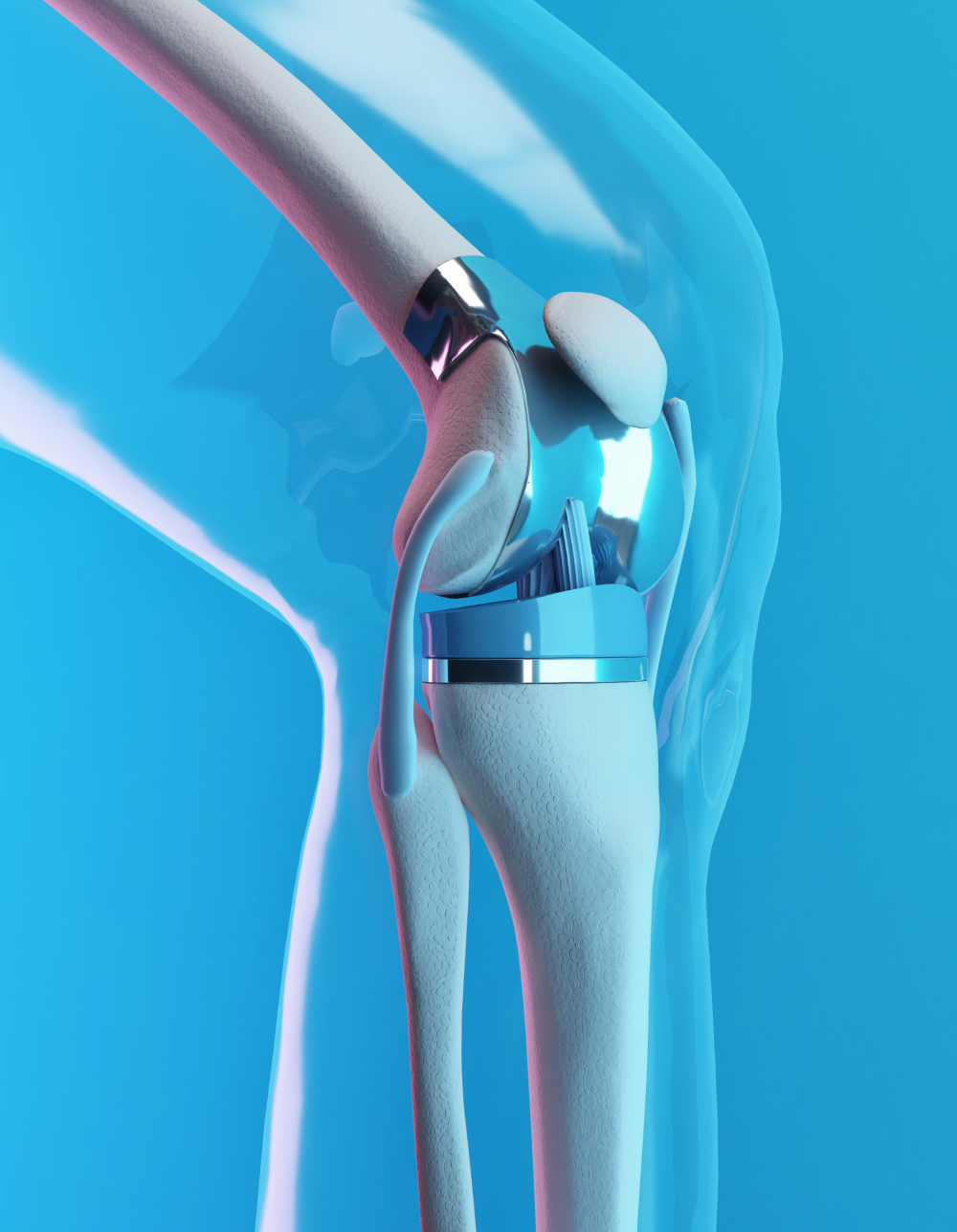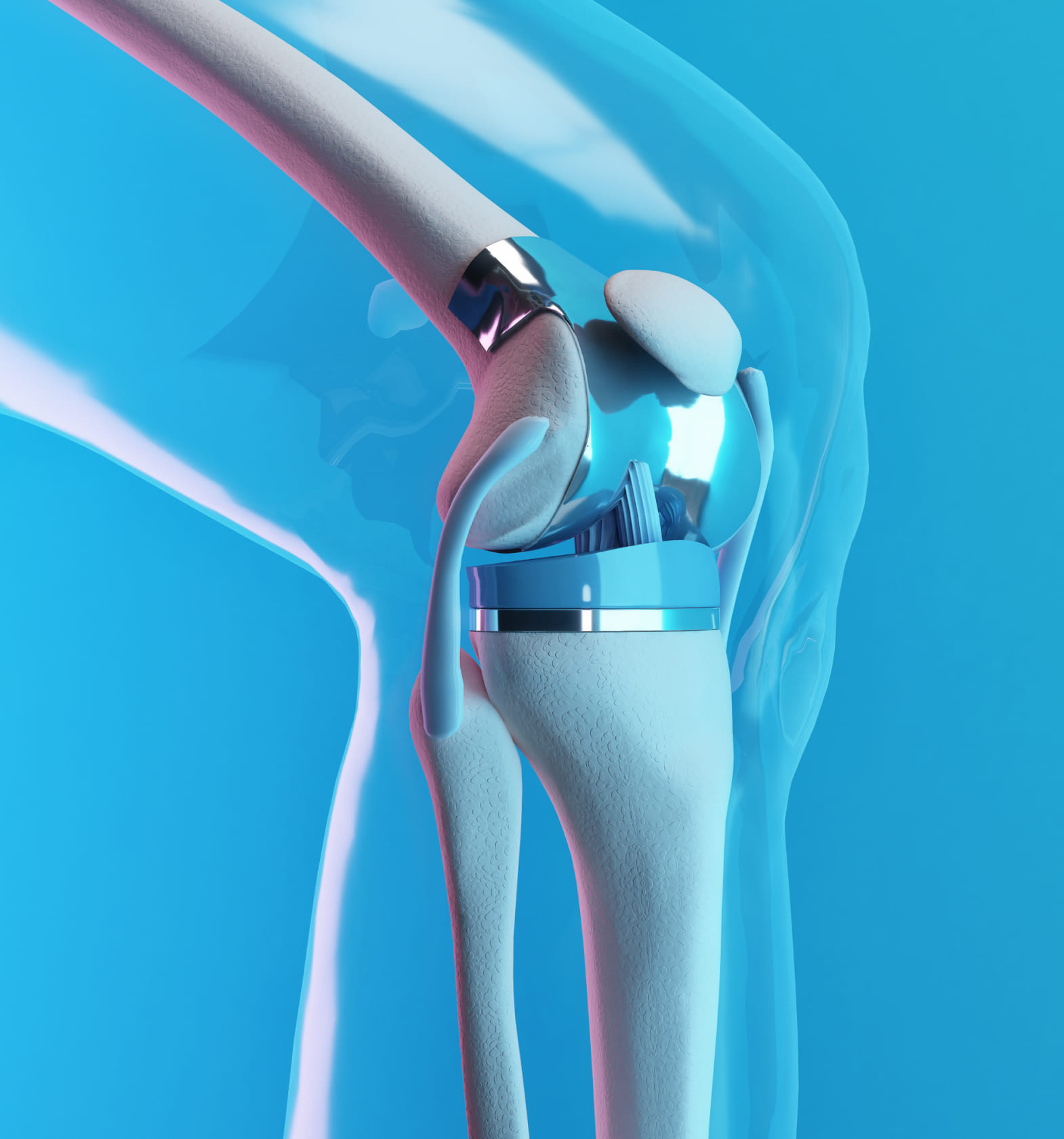Knee Replacement Surgery In Singapore

Dr Wang Lushun
Senior Consultant Orthopaedic Surgeon
MBBS (Singapore)
MRCS (Edin)
MMed (Ortho)
FRCS (Ortho) (Edin)
- Rediscover the joy of pain-free movement through knee replacement surgery
- Fellowship-trained orthopaedic surgeon
- Internationally recognised, more than 1500 surgeries performed



What is Knee Replacement Surgery?
Knee replacement surgery replaces a knee joint’s damaged surfaces with an artificial implant made of biocompatible metal and plastic. It’s a common treatment for severe “wear and tear” knee arthritis, rheumatoid arthritis, or advanced degeneration from previous injuries.
Benefits of Knee Replacement Surgery:
- Relieves knee pain and discomfort
- Improves knee flexibility and range of motion
- Increases knee stability and corrects deformity
- These advantages allow for pain relief, increased mobility and better quality of living
- Long lasting results: Provides long-term durability, improving knee function for up to 20 years or more
According to a 2020 study published in The Journal of Bone and Joint Surgery, delaying knee replacement surgery can have a significant negative impact on your knee health and lessen the potential benefits received after surgery.
Signs You Need to Undergo Knee Replacement Surgery
If you’re experiencing the following symptoms, seek medical attention from an orthopaedic specialist. Early diagnosis and treatment can prevent additional harm and enhance treatment outcomes.
Frequent and severe knee pain
You may need a knee replacement if you often experience severe pain in your knees, especially if it impedes daily activities and sleep.
Chronic inflammation
Inflamed knees happen when the cartilage around your knees wears out and start to feel swollen, tender, and warm to the touch.
Decreased mobility
Some patients report having stiff joints and the inability to bend or straighten their legs, which can affect regular daily activities.
Knee deformity
Knee deformities such as swelling or having “bowed” knees may indicate joint damage that needs to be addressed via surgery.
Instability
If walking feels unstable and there’s a constant feeling your knee is “giving way”, it may be a sign that knee replacement surgery is necessary.
Step into a happier, pain-free future
with knee replacement surgery and enhanced recovery techniques
with knee replacement surgery and enhanced recovery techniques
Improve your knee's mobility and relieve pain while minimizing the chances of additional damage or injury.
Knee replacement surgery can improve your quality of life by restoring your knee function so you can get
back to doing the things you love.
Am I A Candidate for
Knee Replacement Surgery?
If you experience severe knee pain, stiffness, deformity or instability when walking, you may be a candidate for knee replacement surgery. Here are other factors orthopaedic specialists consider when evaluating patients for the procedure:


Is a Knee Replacement a Major Operation?
Yes, knee replacement surgery in Singapore is considered a major operation. It involves removing the damaged portion of the knee joint and replacing it with an artificial joint. The procedure usually requires general anaesthesia or spinal anesthesia, and patients typically stay in the hospital for a few days to recover.
Enhanced Recovery after Surgery
With enhanced recovery surgical techniques and protocols, patients are usually discharged after 1-2 days and started on an enhanced recovery program. Dr Wang Lushun specialises in ERAS (enhance recovery after surgery) techniques and has won awards for delivering superior outcomes in knee replacement surgery.


When Is The Best Time To Have Knee Replacement Surgery?
Do not let knee pain stop you from active living, it is recommended to have knee replacement surgery when the pain and decreased mobility have become severe enough to interfere with daily activities and when non-surgical treatments are no longer effective.
Consult with a qualified orthopaedic surgeon to discuss your individual circumstances and determine the best timing for the procedure.
Knee Replacement Surgery Recovery Process
| Recovery Period | What to Expect: |
|---|---|
| Immediately after surgery (Week 0-2): |
|
| First weeks after surgery (Week 2-6): |
|
| First few months after surgery (Week 6-12): |
|
| Several months after surgery (12 weeks and beyond): |
|


Dr Wang Lushun
Senior Consultant Orthopaedic Surgeon
MBBS (Singapore)
MRCS (Edin)
MMed (Ortho)
FRCS (Ortho) (Edin)
Internationally Recognised & Double Fellowship-Trained Surgeon With Over 18 Years of Experience
- Bachelor of Medicine & Bachelor of Surgery (MBBS),
National University of Singapore - Member of The Royal College of Surgeons (MRCS),
Edinburgh, United Kingdom - Master of Medicine in Orthopaedic Surgery (MMed),
National University of Singapore - Fellow of The Royal College of Surgeons in Orthopaedics and Traumatology (FRCS), Edinburgh, United Kingdom
As a Senior Consultant Orthopaedic Surgeon and former Head of the Hip and Knee Division in Ng Teng Fong Hospital, he has won awards for superior patient outcomes (value driven), service quality and enhanced recovery programmes. His patients include current and former national athletes and sporting professionals.
Why Choose
Dr Wang Lushun?
Trusted
Leadership on Orthopaedic Advisory Boards
Skilful
Double Fellowships at Centres of Excellence
Experienced
Senior Consultant with Over 18 Years of Experience
Can I Use Medisave For Knee Replacement Surgery?
Yes, you can use up to SGD 4-5k from your Medisave account.
Reach out to us today to learn more about payment options.
Patient-Centred Orthopaedic Care
We are dedicated to your recovery and well-being. Every patient deserves the freedom that comes with active living. Whether you're an athlete sidelined by an injury or a weekend hobbyist desperate to return to your passion, our mission is to help you regain your mobility and independence.
Personalised Approach For Positive Outcomes
Our clinic prioritizes time dedicated to understanding each patient’s injuries and needs. Dr Wang strongly believes that personalised care & patient management will lead to better outcomes & positive experiences.
Minimally Invasive Techniques For Faster Recovery
Dr Wang’s extensive experience with minimally invasive procedures allows for less scarring, lower risk of complications and faster recovery compared to traditional surgical methods.
Aftercare Focused On Restoring Mobility & Well-Being
As an avid sportsperson, Dr Wang understands the time and patience required to regain mobility and return to active living. After your procedure is completed, Dr Wang will make sure your recovery is smooth and comfortable.
Insurance
We accept all patients, with or without insurance plans. Additionally, we are on the specialist panels of these Health Networks/Insurance Plans. Please contact us if you have any queries and we will be happy to assist you in checking with your insurance provider.
Our Clinic Locations
3 Mount Elizabeth, #13-14
Mount Elizabeth Medical Centre
Singapore 228510
820 Thomson Road, Mount Alvernia Hospital, #05-51, Medical Centre D, Singapore 574623
Frequently Asked Questions
How Long Does It Take To Recover From a Knee Replacement Surgery?
Recovery time after knee replacement surgery depends on the individual patient and their overall health status before the procedure. Generally, it takes around 6-12 weeks or longer to recover. During this time, patients will need to attend physical therapy and follow a personalized rehabilitation plan to help regain mobility and strength in the affected knee.
What are the risks and complications associated with knee replacement surgery?
As with any surgery, knee replacement surgery does carry some risks and potential complications, such as infection, blood clots, nerve damage, and implant failure. However, these risks can be minimized through careful preoperative planning, skilled surgical techniques, and appropriate postoperative care. Your orthopedic surgeon can discuss these risks and complications with you in more detail.
How long does a knee replacement surgery take?
The duration of a knee replacement surgery can vary, but it typically takes around 1-2 hours. Factors that can affect the length of the procedure include the severity of the knee damage, the patient’s overall health status, and the specific surgical technique used by the orthopedic surgeon.
Can I still participate in sports or other physical activities after knee replacement surgery?
Most patients can resume normal physical activities after knee replacement surgery, although full recovery may take several months. High-impact activities such as running and jumping may not be recommended, as they can put excessive strain on the artificial joint and increase the risk of damage.
How long does a knee replacement last?
The lifespan of a knee replacement can vary depending on factors such as the patient’s age, activity level, and the type of implant used. However, on average, a knee replacement can last for up to 20 years or more with proper care and maintenance.
Can I drive after knee replacement surgery?
Patients are usually advised to avoid driving for several weeks after knee replacement surgery, as it can be difficult to operate a vehicle while recovering from the procedure. Follow the advice of your orthopedic surgeon and physical therapist regarding when it’s safe to resume driving.